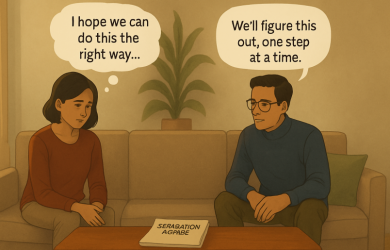How Long Can You Be Legally Separated?

Unlock Daily 30-Sec Tips for a Happier Relationship
👉 Subscribe FREEKey Takeaways
Marriage.com AI Quick Summary
If you are legally separated from your spouse, you may remain so for as long as the two of you desire. There is actually no need for you to get a divorce at some point.
What is a legal separation and what does legally separated mean?
By definition, a legal separation is a court order that mandates the rights and duties of a couple who live separately, even as they remain married. A legal separation does not involve the dissolution of marriage. Legal separations, though not very commonplace, trump divorce and emerge as a better choice for spouses who feel that a divorce will affect the personal and financial aspects of their lives.
If you want to know how to file for legal separation you can read more about it here. But before that, here are few things to consider.
How long can you be legally separated?
If you are legally separated from your spouse, you may remain so for as long as the two of you desire. A legal separation is reversible. How long can you be legally separated is your own judgment call. To be legally separated from your spouse, there is actually no need for you to get a divorce at some point. Dating while legally separated could be a possibility but for it to transpire to marriage, the estranged couple has to get a divorce.
Legal separation vs Divorce
Getting divorced will only mean that you will be free to marry someone else in the future. You and your spouse may remain legally separated for the rest of your life if you both choose to do so.
Studies indicate that the overwhelming majority of married couples who legally separate get divorced within 3 years of their separation. On the other hand, roughly 15% remain separated indefinitely, many for ten years and longer.
So why would a couple choose to remain legally separated indefinitely rather than getting a divorce?
A couple may opt for a legal separation as opposed to a divorce due to their religious beliefs or personal values that do not support divorce. Health insurance coverage is a very common reason for people to resort to legal separation even when it costs just the same as a divorce.
How long is a legal separation good for you?
Experts suggest that a long, indefinite period of legal separation can lead to a build-up of resentment, mistrust and communication gap. Having said that, it is important to have a period where both parties give each other time to cool off. Utilize this time window to recover from past experiences that paved the way for the marriage breakdown. This break is needed for self-evaluation that will facilitate judicious decision making. Whether you are looking at marriage restoration or separation marriage or the possibility of an impending divorce, a maximum of a year is recommended as a good time for a healthy separation.
The advantages of remaining legally separated
By and large, financial concerns appear to be the biggest factors that can determine whether or not a couple remains legally separated for an extended length of time.
In particular, there are a number of specific financial concerns that can have a huge effect on a couple’s decision to remain separated without a getting divorced, whether they live apart or under the same roof.
When you and your spouse decide to legally separate, you can use a Separation Agreement to work out a division and maintenance of your property, assets and financial liabilities. A mediator or an attorney can help you and your partner reach a separation agreement.
These financial concerns include, but are not restricted to, the following:
- Health insurance: Remaining legally separated rather than getting divorced can ensure that both spouses continue to be covered by any healthcare insurance they enjoy due to the fact that they are married. This can obviously be a huge advantage if one spouse relies on the other for health insurance.
- Tax benefits: Remaining legally separated rather than getting a divorce can also allow the couple to continue to benefit from certain income tax advantages that are only available to married individuals.
- Social security and/or pension benefits: With regards to a marriage of ten years or longer, an ex-spouse may be entitled to a share of the other spouse’s Social Security or pension benefits. Separated couple who are on good terms may choose not to divorce in order to allow one spouse or the other to reach that ten-year threshold.
- Mortgage/home sale: Some couples may choose to remain separated rather than getting divorced in order to avoid having to incur a loss due to the sale of the family home, or to avoid burdening one or both spouses with mortgage issues.
The drawbacks of remaining legally separated
If you happen to be separated or contemplating a separation, bear in mind that the financial advantages may very well be overshadowed by the following drawbacks:
- Shared debt: Debt is often held jointly by married couples. Depending on the laws of the state where you live, this can mean that one spouse may be responsible for half of the other spouse’s credit card debt, even if they have been separated for an extended length of time. If your spouse doesn’t pay his or her credit card bills, your credit may also be negatively affected.
- Changing financial situations: Each spouse’s financial situations can change significantly over the course of an extended separation. If you wind up getting divorced later on, the spouse who is better off financially at the time of the divorce may have to pay a lot more spousal support than they might have been required to pay had you gotten a divorce at the time you separated. This is despite the fact that the receiving spouse made no contribution (financially, emotionally, or physically) to the paying spouse during the course of your separation.
- Other drawbacks: In the event that one of you dies before you are legally divorced, there can be disputes over the decedent’s estate if other heirs are not aware that you were still legally married.
In addition, if you are estranged from your spouse after legal separation, and he or she relocates while you are separated, you may have a very difficult time finding them when you do decide that you want a divorce, perhaps in order to remarry.
How long do you have to be separated to be legally divorced?
A legal separation can be a prelude to the divorce. A couple could leverage this time to resolve personal, custody and financial issues in their lives while staying married to each other. However, during the period of being legally separated, the spouses remain married. They can not remarry. The marriage remains intact. However, if they decide to get divorced subsequently, either of the spouses may convert the separation into a divorce after six months have passed.
For more information on the advantages and disadvantages of remaining legally separated for an extended length of time, contact an experienced family law attorney who has knowledge of the laws governing legally separations in your state.
You can also go through some separation agreement templates, separation papers and separate maintenance decrees for some research.
 Tips
Tips
Write your tip or submit a video tip
All tips are reviewed before the publishing.
Share this article on
Want to have a happier, healthier marriage?
If you feel disconnected or frustrated about the state of your marriage but want to avoid separation and/or divorce, the marriage.com course meant for married couples is an excellent resource to help you overcome the most challenging aspects of being married.
Recent Articles
Related Quizzes
Unlock Daily 30-Sec Tips for a Happier, Healthier Relationship
👉 Subscribe FREE on YouTube We'd love your feedback!
We'd love your feedback!
 Expert Q&A
Expert Q&A
Ask your question related to this topic & get the support you deserve from experts.

 Legal Guide
Legal Guide


















 Thanks for your feedback!
Thanks for your feedback!